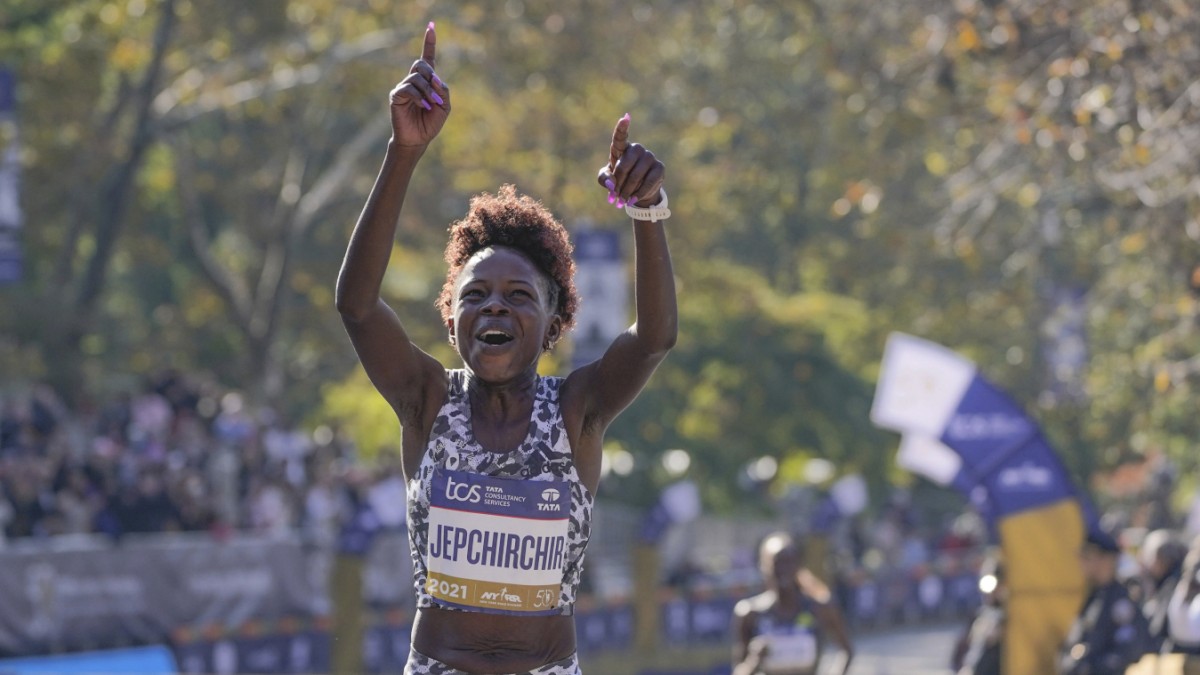The first visual evidence was not exactly flattering for Peres Jepchirchir, the big favorite on Sunday in the big marathon through New York. The upper body: leaned a bit forward. The steps: almost stamping, unusual for a runner from the East African running guild. Hard to compare with Viola Cheptoo, the second Kenyan at the head of the field, and the Ethiopian Ababel Yeshaneh. In this light they floated like fairies through the jungle of houses of the American east coast metropolis. But Cheptoo, a long-time 1,500 meter runner, and Yeshaneh do not have the references of a Jepchirchir with them either, the Olympic victory in the marathon, for example, which the 32-year-old had only placed in her vita three months ago. And then there is still her gaze.
There are photos of Jepchirchir, there speaks from her eyes a determination that seems almost eerie – and which she seems to carry with her like a reminder. Where others quietly doubt where the long-haul journey could take them, Jepchirchir seems to have a plan for every second of the unplanned 42.195 kilometers. So also on Sunday in New York.
She shared the pace work with Cheptoo for a long time, although she knew that her compatriot would be equal in the finish sprint, thanks to her expertise in the middle distance. Then Jepchirchir launched the sprint very early, apparently taking Cheptoo, a debutante in the marathon, by surprise. Admittedly, not much would have been missing, and Jepchirchir would have paid for the early attack, on the other hand it is like this: She has never lacked the courage to plunge into the cold sea of uncertainty.
First Olympic gold, then victory on the difficult course in New York – nobody has managed that before Jepchechir
It is a considerable level, to be careful, at which the long-distance scene is surfing again. The Ethiopian Letesenbet Gidey, the world record holder over 5000 and 10 000 meters, recently set the record in the half marathon to 62:52 minutes – with such a reference she could even break the sound barrier of 2:10 hours in the marathon. So far, only nine German men have managed that. But of course that is talk of the future.
The present in the marathon undoubtedly belongs to Peres Jepchechir. She won the Half Marathon World Championships in Gdynia in the past 14 months, set two world records over this distance, triumphed in the Olympic marathon in the hot and humid Sapporo, which cost a lot of strength, but apparently not enough to help her win in New York prevent. There she almost wiped out the course record (in 2:22:39 hours), just before Cheptoo (who dedicated her second place to her compatriot Agnes Tirop, who died violently).
No athlete at all, no woman, no man had managed that: to triumph in the Olympic marathon – and then on the difficult course in New York. The last athlete for the time being to ever run a city marathon after American Frank Shorter won his Olympic victory in the same year, in 1972, in a completely different time. And now?
Jepchirchir has one of these clichéd biographies of runners with him, unfortunately one has to put it this way: grew up in Kericho in western Kenya, her parents were farmers on the tea plantations; the daughter ran to school every day, three miles there, three miles back. In 2014, at the Kenyan cross-country championships, she was first noticed by connoisseurs. She was 20 then, fearlessly ran away from the favorites; Faith Kipyegon, most recently Olympic champion over 1500 meters in Tokyo, only caught Jepchirchir in the last meters. The Italian Gianni Demadonna, an experienced manager, immediately signed her. He was not only impressed by Jepchirchir’s perseverance. “She is not only highly motivated”, he said once, “She also has a sturdy head.”
After a little over two hours there is still time for a hop: Albert Korir wins the men’s race in New York in 2:08:22 hours and makes Kenya’s one-two perfect.
(Photo: Lev Radin / Imago)
—
You probably need it if you are still creating half marathon records like a year ago in Gdynia, Poland, where the Baltic Sea wind whipped onto the track. So Jepchirchir gradually unlocked her potential, in 2016 the first world championship title in the half marathon, in 2017 the first world record (65:06), at that time she was already pregnant with daughter Natalia. She also took her time with her comeback, she only ran her first fast marathon in December 2019, in 2:23:50 hours in Saitama. Then Corona forced the scene to stand still. Jepchirchir’s training group in the height of Kapsabet is manageable anyway, it consists mainly of her husband, a former runner. When almost everything finally failed, said Jepchirchir, she just trained more.
You can never shine into all the depths of the athlete’s body, Jepchirchir’s predecessors in the top of the world also, cautiously, have not the purest past. And whether the recent record waves and one-two victories like those in Tokyo and New York can be explained solely by new wonderful shoes, while the anti-doping system was idle months earlier? In any case, Jepchechir has always asserted that she draws her strength from honest motives. Jepchechir once said that this is at the latest since her daughter has understood what work her mother is doing: “She always tells me: ‘I want to run like mom'” “
– .


